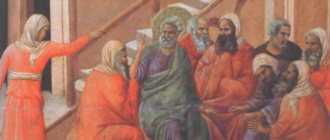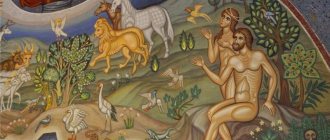CHAPTER I. THE FORMATION OF CHRISTIANITY AS A NEW CULTURAL-INTELLECTUAL FORCE
It is important to explain why the peoples of the Roman Empire, among whom, first of all, Christianity began to spread, were so receptive to this teaching, why did Christianity grow to the scale of a world religion? Our task is to reveal those natural, socio-cultural mechanisms that led to the fact that the teachings of the Jewish prophet Jesus became a world religion that had a huge impact on the course of world development.
Christian apologetics claims that, unlike all other religions of the world, Christianity was not created by people, but was given to humanity by God in a ready-made and complete form. However, the comparative history of religious teachings indicates that Christianity was not free from religious, philosophical, ethical and other influences. Christianity assimilated and rethought the previous ideological concepts of Judaism, Mithraism, ancient Eastern religions, and philosophical views. All this enriched and cemented the new religion, turning it into a powerful cultural and intellectual force, capable of opposing itself to all national and ethnic cults and turning into a mass supranational movement. The assimilation by early Christianity of the previous religious and cultural heritage did not at all turn it into a conglomerate of disparate ideas, but contributed to a fundamentally new teaching to gain universal recognition.
INTRODUCTION
Christian culture is diverse; those peoples who accepted the religion of Jesus Christ consider it theirs. Christianity is a collective term to describe its three main directions: Orthodoxy, Catholicism and Protestantism. Each of these large movements, in turn, is subdivided into a number of smaller faiths and religious organizations. But they are all united by common historical roots, certain tenets of doctrine and cultic actions. Christianity is the most widespread of all world religions. According to the UN, there are currently more than two billion followers of Christianity in the world. Of course, this is far from accidental. Let's look into history and try to trace the objective reasons that determined the formation and consolidation of Christianity.
Christianity has come a long way before it became a world religion and the spiritual basis of European culture. It originated in the 1st century AD, which we count from the Nativity of Christ, and was initially formed in the bosom of Judaism, as one of its sects. But the content of the sermon of Jesus of Nazareth went far beyond the national religion of the ancient Jews. It was this universal meaning of Christianity that made Jesus the Christ (Savior, Messiah) in the eyes of millions of people who find the semantic basis of their lives in the Christian faith. Christianity quickly separated from Judaism, becoming an independent religion with its own specific creed, its own liturgical practice and church organization.
In Palestine, by the end of the first half of the 1st millennium BC. one of the earliest monotheistic religions
. The Jewish king Josiah at the end of the 7th century. BC. carried out a religious and political reform, as a result of which a single cult was established - the cult of the god Yahweh, and which must be understood as a fight against superstition. Superstition is an “apparent” religion because it obliges a person to revere objects or specific images whose dignity is beneath the dignity of man. The formation of Judaism as a monotheistic religion, where only the cult of the god Yahweh was recognized, was a step towards a higher religion, since the object of worship became higher than other objects that can be seen around you. In monotheism, thereby, the idea of the highest was transferred from the material world to the spiritual world. Consequently, the advantage of monotheism was the emergence of human spirituality, which was achieved by the recognition of a single super-worldly essence - God. Another advantage of Jewish monotheism was the idea of a future that should be better than the present. In Judaism, albeit in a primitive, mythological form, the idea of progress was already expressed.
Let us pay primary attention to what Judaism was at the turn of our era.
Messianic sentiments among the Jews were constant, but their manifestation at different historical periods of time was not the same. During the period of social stability, “law” ascended to first place, and messianic expectations faded into the background. When Jewish society experienced a crisis stage of its development, messianic sentiments awakened and actively spread.
In the 1st century AD Judea was experiencing an acute crisis associated with pressure on the population from three levels of power: the Roman emperor and his tetrarchs, King Herod Antipas, the priests of the Jerusalem Temple and various ideological groups located next to them (Pharisees, Sadducees, Zealots, etc.). Each of these authorities exploited the people, forcing them to pay exorbitant taxes, and dictated certain forms of behavior that often contradicted the moral beliefs and beliefs of the Jewish people.
It is not surprising that this state of constant and increasingly clearly growing political and religious crisis led to a sharp revival of eschatological prophecies and to the activation of more and more new sects with their impatient expectation of the Messiah, who is about to come and in the name of the great Yahweh will save those entangled in complex contradictions God's chosen people. Everyone was waiting for the Messiah from day to day. And he could not help but come.
Increasingly, in one place or another in Judea, and even outside it, on the periphery, among the Jews of the Diaspora, leaders of various sects or wandering preachers declared themselves messiahs, called to save the lost Jews. Usually the official authorities reacted painfully to the sermons of such figures, suppressing their activities. This, however, could not stop the process itself.
The Bible names two great prophets of that time - Jeremiah and John the Baptist. These preachers sought to attract people's attention with an unusual appearance. Jeremiah preached with a yoke around his neck, John the Baptist wore clothes made of camel's hair, did not cut his hair, lived as a hermit in the desert, ate dried locusts and was very thin. His appearance alone made an indelible impression on people. And his speeches, exposing the moral decline of those in power, the debauchery that reigned in the palaces, and the disregard for the needs and suffering of people, found a lively response among the masses.
Among the numerous communities, political movements and religious sects of Palestine, the idea of the need for a new agreement between God and people, based on higher moral requirements for the individual, was maturing. The existing (Old) Testament no longer satisfied them, since it was also recognized by those layers of Jewish society that, as the community members believed, had long departed from the true faith. The community members expected deliverance to be brought by a specific person. They looked in the Old Testament for confirmation that the future deliverer must certainly be a descendant of the ancient King David, anointed by God as king (“anointed” in Hebrew - Mashiach, in Greek - Messiah or Christ). Not accepting the structure of Roman society, the community members imagined the kingdom established by the messiah, not in the form of a civil republic or empire, but as an ideal, just society.
Thus, in the 1st century, Christianity arose in Palestine, one of the three world religions (along with Buddhism and Islam). Christianity appeared among Jews, but came into sharp conflict with Judaism. Judaism is a national religion, in which only one people is recognized as God’s chosen one, Christianity is supranational, not just any nation, but every individual person is recognized as the chosen one. Therefore, Christianity quickly spread and became the religion of many peoples.
Modern use in world liberal or left-wing politics
In the US, Australia, the United Kingdom and other 21st century countries, the phrases Christian values and family values are used by some liberal or social democratic political groups to describe some or all of the following political positions:
- Supporting a culture of empathy and compassion is considered central to Christianity across a wide range of religions and worldviews; prioritizing the interests of individuals, families (of any composition) and small communities over the interests of large corporations and the powerful.
- Protecting the environment as a result of deep reverence for God's creation.
- War is undesirable except as a last resort and respect for diplomacy (see swords into plowshares).
- Involve and accept immigrants and refugees.
- A living wage for everyone and the right of workers to form trade unions in accordance with the solidarity nature of man.
- A high, progressive income tax would promote greater income equality in line with Jesus' words in support of the poor and against excessive wealth.
- Promoting "Render unto Caesar" as an endorsement of secular governance, the separation of church and state (secular laws do not affect or affect relationships with religious freedom such as same-sex marriage; churches can refuse to host weddings for same-sex couples) and religious tolerance, which is consistent with the concept The Kingdom of Christ is not of this world and warns against the lust for potentially corrupting secular power throughout the Bible.
Recommendations
- Ronald Simkins; Gail S. Risch (March 1, 2008). Religion and family
. Fordham Univ Press. ISBN 978-1-881871-49-1. - Edgell, Penny; Dokka, Daniel (2007). “Beyond the nuclear family? Familism and gender ideology in various religious communities.” Sociological Forum
.
22
(1): 25–50. CiteSeerX 10.1.1.601.6524. Doi:10.1111/j.1573-7861.2006.00003.x. ISSN 0884-8971. - Gregory D. Black, Hollywood Censorship
, paragraph 39. “Daniel Lord developed the Hollywood censorship code. The result is a fascinating combination of Conservative politics, Catholic theology and pop psychology,” Cambridge University Press, 1994, ISBN 978-0521452991. - "Geneva Declaration". “Marriage between a man and a woman forms the only moral context for natural sexual union. Whether it be pornography, promiscuity, incest or homosexuality, deviation from these sexual norms may not actually satisfy human souls."
- "Christianity, Intelligent Design, the Evolutionary Theory Movement in the United States, and the Separation of Church and State." Political observers have noted the rise of the religious right during the presidency of George W. Bush. Although Christianity and politics have often been intertwined in American culture, the Bush administration has funded religious initiatives more thoroughly than any previous president. Moreover, President Bush has noted that he supports the teaching of intelligent design along with the theory of evolution in public schools."
- “Why write about homosexuality?” “The Bible clearly condemns homosexuality as a sin, and Christians who seriously follow God's Word should also condemn it as a sin.”
- “Prayer in the Public School—A Brief History.” AllAboutHistory.org. Retrieved July 23, 2012.
BASIC VALUE SYSTEM OF CHRISTIANS
| № | Concept | Moral assessment | Emotion |
| God | very good | fear | |
| Devil | very bad | fear, horror | |
| Christ | beautiful | love, gratitude, admiration | |
| Antichrist | horrible | fear, horror, hatred | |
| Internationalist | good | respect | |
| Nationalist | bad | contempt | |
| Speculator | bad | contempt, hatred, fear | |
| Banker | very bad | hatred, envy | |
| Entrepreneur | bad | envy, hatred | |
| Humility | Fine | OK | |
| Pride | Badly | dislike |
This table can be continued for a long time, it is long, but we will not do that. The main thing is to understand its meaning. And the point is that every basic concept (label, symbol) is always defined in strict connection with moral assessment and emotion. This table creates a basic system of standards of thinking, with the help of which a person evaluates what is true, what is false, what is good, what is bad, what is beautiful, what is ugly. After completing human programming, any concept (label, symbol) is never perceived by a person separately, but always with a moral assessment and emotion.
The entire procedure of human thinking, after a series of logical steps, rests on these basic stereotypes . That is, all information entering a person’s head is comprehended and evaluated using this table of basic values, basic standards.
Those who control the crowd know that the crowd is not guided by logic, but by emotion. All demagoguery and mechanisms for controlling and manipulating people are based on this. By pressing the keys of labels (concepts, symbols) at the right time and evoking the appropriate emotions, it is easy to control the public opinion of the crowd.
For example, in a crowd controlled by demagogues, a strong speaker appeared that the demagogues could not cope with logically. It is enough for demagogues to shout: “He is a provocateur.” The crowd will immediately scream and the speaker will be neutralized. They will no longer listen to him, he will have to justify himself, prove that he is not a provocateur, that he is good, and the crowd will already doubt it, and all the attention of the crowd will be diverted.
If the crowd perceives a speaker as an enemy and experiences negative emotions towards him, then everything that this speaker says will be perceived negatively, regardless of the truth of the speaker’s speeches.
Representatives of different religions and ideologies have different value systems , that is, the values in this table are different. And every believer considers the values in his table to be true and never questions them. On the contrary, the truth of all other information is assessed using a table of basic values. Those religions that we analyzed (Judaism, Christianity and communism) deliberately set a false system of basic values.
A Christian has a table in his head in which more than 50% of the rows have false values. How did this happen? How did a Christian get false basic knowledge implanted in his head? How did you manage to convince him of the “truth” of lies and the “falsity” of truth?
All religious puppeteers are excellent psychologists; they do not need to study books on psychology. They have studied everything for a long time. How to make a person believe in the correctness of Christ's preaching? It would be possible to analyze the logic of Christ’s sermons and their consequences (which is what I am doing in this book), but then the priests will be doomed to failure. They do things differently. Christian programming is done not through logical conclusions, but through emotions.
At first the priests say: “You are all sinners, you deceive a lot, you make a lot of mistakes in life, you break the commandments . People feel guilty. Then the priests say: “But, despite all your sins, Christ still loves you , and he took all your sins upon himself, Christ saved you all, he accepted death for you, he is a hero, he suffered for you.” The crowd experiences emotions of gratitude , joy (because their sins have been blamed on someone), respect for Christ, and admiration for his “heroic” act. No one is discussing the logical meaning of this action anymore. Nobody understands the logical senselessness of this “heroic” act. The brain is switched to emotions. The left hemisphere of the brain turns off and only the right hemisphere works. After that, in this table in the line “Christ” in the column “moral assessment” the value “wonderful” is automatically written. That's it , the job is done, without any logic, a basic false value is implanted into the head of a believer.
Further, this line from the table already works to make you believe that all the abomination that Christ preaches is the truth. But what about it? Since Christ is beautiful, since he loves us, since he is a hero, since he wants good for us, it means that everything that he preaches is the truth. This is why all sorts of tricks like Christ's salvation are invented. These are psychological techniques. Everything is very well thought out. And the fact that this does not affect intellectuals does not frighten the priests. There are few intellectuals, but there are many crowds of people.
And in order to neutralize their opponents, who can logically smash Christianity into dust, priests need to introduce into the Christian’s head an emotional barrier to the logical perception of criticism of Christ. This is done with the help of the idea of the Antichrist and the introduction of the emotion of fear and horror of the Antichrist. programmed with this powerful emotion simply will not listen to criticism of Christianity. He will be afraid of both words and thoughts.
If you fail to extinguish and overcome the emotions of a Christian, then your logic in criticizing Christian nonsense will always run into a reinforced concrete wall of fear, horror, admiration, hatred and other emotions. Only emotions. Logical thinking will not work at all. A Christian’s logical thinking is paralyzed and restoring it is not an easy task. This is the main task of Satanists - to turn off the left hemisphere of the brain.
The overwhelming number of Christian believers do not read the Bible. The values in the head of a Christian did not appear as a result of reading the Bible, but as a result of psychological tricks. When you show a Christian what is written in the Bible, he begins to get out, come up with all sorts of nonsense, just to keep in his stupid head those vicious values that were implanted in his head and to which he is accustomed. Texts from the Bible become an unpleasant revelation for a Christian believer.
Programming consciousness is never done explicitly. You will never see such tables of basic values explicitly anywhere. On the contrary, the explicit content of such tables is a sealed secret. Christianity programs people’s brains not explicitly, but at the subconscious level, and those who try to bring the essence of Christian values to the surface of consciousness are persecuted. A striking example is L.N. Tolstoy. He studied the Bible for a long time, perfectly understood all the abomination of the Old Testament and called the Jewish god a wild half-monster. However, Tolstoy accepted the New Testament and really understood the essence of Christianity, although he did not understand that this essence was vicious. When he put forward the general idea of “non-resistance to evil through violence,” he was excommunicated and anathematized.
But Tolstoy is right. It is this idea of “non-resistance to evil through violence” that is one of the main ideas of Christianity. Only Christians explicitly hide it and carry it out implicitly, at the subconscious level, but Tolstoy formulated it explicitly and brought it out for everyone to see. He revealed just one line from the table of basic values , revealed one of the secrets of Christianity, and the highest priestly hierarchy hated him.
After formulating one of the main ideas of Christianity, “non-resistance to evil through violence,” in an explicit form, it immediately becomes clear to any thinking person who benefits from Christianity. Christianity is beneficial to evil (Satan), which does not want to meet strong resistance and wants to disarm its opponents.
To be completely precise, Tolstoy, having said A, did not say B, he was afraid to think it through and finish it. The point is not only how to resist evil: whether with the help of violence or not. Jesus, the son of David, preaches completely without any connection with violence or non-violence. He generally does not want people to resist evil in any form: “But I tell you: do not resist evil. But whoever strikes you on your right cheek, turn the other to him also, and whoever wants to take your shirt, give him your outer garment also” (Matthew 5:38-40) .
So the main basic value of Christianity sounds even more disgusting than Tolstoy’s: “Do not resist evil!” This sentence contains the whole essence of Christianity. This sentence is key and it is similar to Marx’s key proposal, in which he expressed the main essence of communism: “Communism is the destruction of private property!”
On the tables of basic values, it is easy to clearly see who a given religion is programming. Let's reveal the secrets of religions and, removing the columns of emotions for simplicity, we will show a few lines of Christianity, Judaism and paganism-Rodnoverie in comparison.
| № | Concept | Christianity | Judaism | Russian Rodnoverie |
| Moral assessment | ||||
| Ambition | Badly | Very good | Very good | |
| Pride | Badly | Very good | Very good | |
| Self confidence | Badly | Very good | Very good | |
| Humility, submission, patience, self-denial | Fine | Badly | very bad | |
| Crying, suffering | Fine | Badly | Badly | |
| Fun and happiness on earth | Badly | Fine | Very good | |
| Poverty | Fine | very bad | Badly | |
| Wealth | Badly | very good (no measure) | good (in moderation) | |
| Will to power | Badly | Very good | Fine | |
| The desire for property | Badly | Very good | Very good | |
| The desire to own money | Badly | Very good | Fine | |
| Entrepreneur | bad | very good | very good (if honest) | |
| Banker | bad | very good | very good (if honest) | |
| Love for people | good (to anyone) | good (to Jews), bad (to non-Jews) | good (to the good), bad (to the bad) | |
| Hatred of enemies | Badly | Fine | Fine | |
| Revenge | Badly | Fine | good (fair) | |
| Cruelty | Badly | good (if profitable) | good (if necessary), bad (for no reason) | |
| Love of liquid | Fine | Very good | Badly | |
| Poor love | Very good | very bad | Badly | |
| Love for freaks | Very good | good (to Jewish) | very bad | |
| Nationalism | Badly | very good (if Jewish) | good (no chauvinism) | |
| Chauvinism | Badly | very good (if Jewish) | Badly | |
| Is it true | Fine | good or bad depending on the benefit | Fine | |
| Lie | Badly | good (as a remedy) | Badly | |
| Compassion | Fine | bad (in relation to the goyim) | Fine | |
| A pity | Fine | bad (in relation to the goyim) | good (in moderation) | |
| Scam | very bad | good (in relation to the goyim) | very bad | |
| Theft | very bad | good (in relation to the goyim) | very bad | |
| meanness | Badly | good (if profitable) | Badly | |
| Impudence | Badly | Very good | Badly | |
| Honor | no such symbol | no such symbol | Very good | |
| Homosexuality | neutral | naturally | very bad (sign of degeneration) |
You can describe this table further, but the given lines are quite enough to understand the basic values of these religions and understand what souls these religions program.
From the table it is easy to see that Christianity throws out all the strong-willed and life-affirming values of paganism, lowers the Aryan soul to the very bottom and makes a slave out of him.
The Aryans need to learn from their own pagan religion. She is not weaker, but she is decent and beautiful!
The Orthodox Church and moral values in the modern world
Technical and social progress, the rapid development of information technology, various reforms and innovations are now acquiring global proportions. Along with this, instead of affirming traditional spiritual and moral values, preference is given to material goods and consumer needs. Against the background of these events, the problem of preserving the national spiritual heritage, cultural and historical traditions and values is especially relevant and significant, since it is the spiritual basis that allows a person to correctly comprehend the events in his life and in the life of society, and make the right decisions.
In the 20th century, humanity faced great changes or, more precisely, upheavals, which were associated with various wars, economic, social, political, cultural and ideological imbalances and destabilizing processes. All this gave impetus to the deformation of the spiritual culture of society. Among the most important problems is the shift in religious, moral and value guidelines, the loosening and oblivion of centuries-old foundations, national characteristics, historical and cultural traditions and customs
At all times, great spiritual mentors called on a person to spiritual improvement, strict control over his behavior, to constantly direct his mind to the knowledge of the Divine truth set out for man in the Holy Scriptures, which is based on love for God and neighbor. Following this, a person understands the world through the prism of spiritual values, which become the main factor regulating his behavior and moral improvement, which is the foundation for the education and formation of a specific individual and the entire society. The basis of the mentality, spiritual values and traditional education of the East Slavic peoples is the Orthodox faith.
It is the Orthodox Church that proclaims and brings to man the Divine truth about the salvation of the human soul. If we turn to the instructions of the saints who shone in the Orthodox faith, then it was spiritual values and moral norms and beliefs in the process of education and training that they defined as fundamental. Saint John Chrysostom taught to reflect on spiritual subjects, to listen and study the word of God, to strive for good deeds; Orthodox theologian, church leader, preacher and educator Kirill of Turov called for keeping the mind pure, linking a person’s spiritual growth with the knowledge of higher spiritual values, following the principle “know by believing.” The Monk Euphrosyne of Polotsk instructed to observe spiritual purity and throughout her life contributed to the spiritual enlightenment of her people.
Managing, first of all, oneself, one’s thoughts, actions and desires, working on correcting one’s shortcomings, on moral elevation and cleansing from sinfulness, awareness of the true values of love, goodness, beauty should be the meaning of every person’s life.
It is also necessary to emphasize the importance of the correct organization of the direction of personal knowledge and all moral education that grows out of family relationships. It is well known that it is in the family that enormous educational potential is concentrated and therefore the manner in which relationships are built in it is especially important.
Christian values have a basic status in the moral traditions of the East Slavic peoples. Increased attention is needed to updating the study of Orthodox traditions of upbringing in the content of the educational process, along with the preservation of the ethnocultural heritage of the Russian people at the present stage of development of society. The formation of personality on the basis of Orthodox values and historically determined cultural characteristics should act as a methodological guideline for the national pedagogical scientific environment, which in the future will be a determining factor in the prosperous state, as well as the national security of the entire country.
State authorities have now recognized that the Church is one of the main social institutions, whose spiritual potential and historical experience have influenced the formation of the cultural, spiritual and national traditions of the people. The moral strength of the Church today is increasingly being used energetically to educate the spiritual and moral world of the younger generation. The problem of spiritual and moral development is one of the most pressing in modern society.
In the context of changing values of young people, it is necessary to determine new guidelines in the humanitarian environment. In this regard, the study of the history of the Church is important from the standpoint of a sociocultural phenomenon, which is an integral element of the cultural-historical link on the one hand and humanistic education on the other.
The modern young generation lives in a social environment that has absorbed various cult ideas, and primarily Orthodox ethics, while religious ideas for the overwhelming majority of young people are only an integral part of their worldview, and spiritual and moral guidelines do not occupy a leading place. At the same time, the Orthodox Church is the bearer of spiritual and moral ideals and the custodian of the cultural traditions of the people, therefore it is highly valued in the eyes of modern youth.
In this regard, the power of spiritual ethics is now increasingly being used in order to educate the spiritual and moral world of man. Speaking about education, Ushinsky K.D. said, “that Orthodox teaching should penetrate into all spheres of human life.”
The educational work of the Church in schools is carried out in various forms. For more than 10 years, Orthodox gymnasiums have been operating, where feelings of patriotism are formed, as well as a synthesis of faith and knowledge. The first such gymnasium was founded by the Radonezh society in 1991. In addition, national schools are being established where educational activities are carried out. Thus, in particular, in the Voronezh, Tambov, Oryol and Kursk regions, the subject “Fundamentals of Orthodox Culture” is taught.
Since 2000, scientific, practical and educational readings and conferences have been held in higher educational institutions of Kursk and Voronezh - Pokrovsky pedagogical, Znamensky, Cyril and Methodius, Tatyaninsky and others. For the further development of social and educational projects among students, the association of spiritual and moral education “Pokrov” was organized, the founders of which were 10 universities of St. Petersburg, Kursk, Belgorod, Voronezh, Tambov, the Council of Rectors and the Theological Academy. In a number of educational institutions, chapels have been organized that contribute to the education of students on the basis of traditional values and create a moral atmosphere among teachers and students. The need for more thorough and long-term cooperation between the Church and science led to the formation of the United Scientific and Religious Institution in Moscow in 1999, and in the future it is planned to create such an organization in the regions of Russia.
Thus, the recognition of education as a component of the spiritual worldview will make it possible to form an effective education system in which the path to the higher education of their spiritual inclinations on the basis of self-development, self-determination, and self-realization will be open to everyone. It is this recognition that will contribute to a person’s understanding of himself in the world of social, subject, and spiritual culture, which will determine the model of education from the point of view of three factors - organizational, methodological and social, the leading role in this, in our opinion, should be given to the Orthodox Church, as the guardian cultural and spiritual traditions of the Russian people.
Literature:
- Ushinsky K. D. Collected Works / K. D. Ushinsky. - M.: APN RSFSR, 1948. - T. 2. - 655 p.
- Ershov B. A. The role of the Russian Orthodox Church in the spiritual and moral education of youth in modern Russia // Modern problems of the humanities and social sciences. — 2014. — No. 4. P. 62–66
- Kuznetsov V. A. The Russian Orthodox Church’s view of the modernization of Russia // Human capital. — 2014. — No. 2(62). P.64–67
Modern use in world conservative or right-wing politics
In the US, Australia, the United Kingdom and other 21st century countries, the phrases Christian values and family values are used by the Christian Right and Conservative parties to describe some or all of the following political positions:
- Censorship of sexual content, especially in film and television.[3]
- The desirability of laws against induced abortion.
- Sexual abstinence outside of marriage and sex education are abstinence only.[4]
- Promoting smart design to be taught in public schools and colleges as an alternative to evolution.[5]
- The desirability of laws against same-sex marriage.
- Support for laws against the acceptance of homosexuality into mainstream society.[6]
- The desirability of organized school prayer in public schools.[7]
Story
The history of Orthodoxy goes back to the times of the Roman Empire. Then there was no concept of Catholic or Orthodox, there was a Christian. After the split of the empire into the Western, with its center in Rome, and the Eastern, with its center in Constantinople, two independent directions began to form.
The word "Orthodoxy" means "correct glorification"
There were changes in the rules of rituals and services, in the architecture of the temple, and so on. Even the simple clothes of a priest already caused confrontation between Catholics and Orthodox, not to mention the essence of the teaching itself, because it also underwent significant changes. This is how differences arose in the interpretation of certain moments of the Bible.











